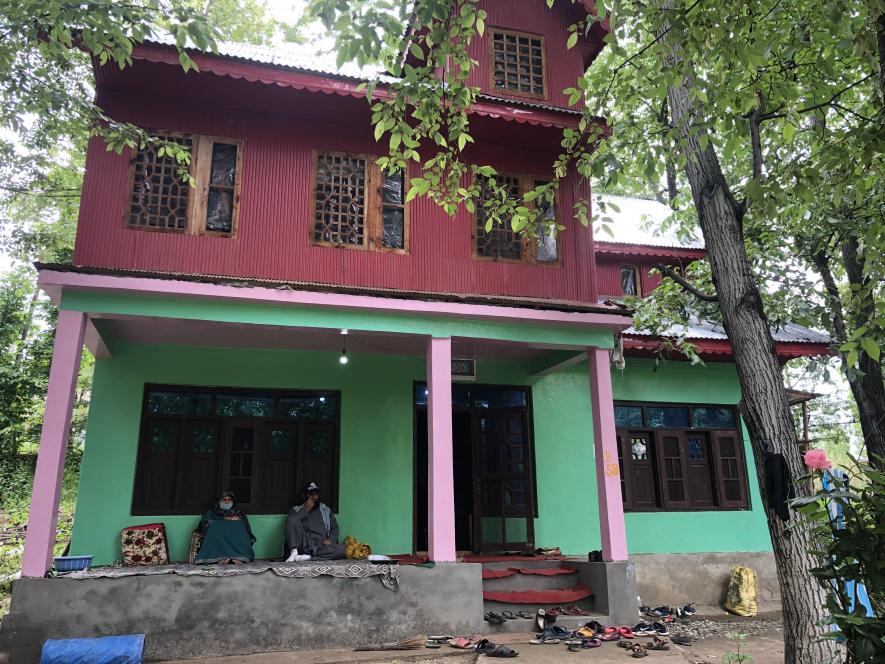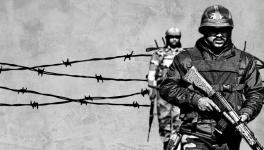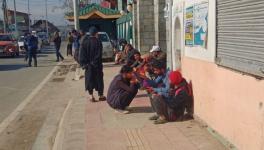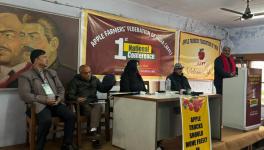Kashmiri Youth’s Suicide Highlights Struggles in Valley

Shoaib Mir's house. | Image Credit: Kamran Yousuf
Avil: When the great flood rampaged through Kashmir in 2014, it destroyed Mohammad Abbas’s home but, his childhood friend Shoaib Mir offered him both shelter and food – giving him hope only to run out of it for himself.
A few days ago Shoaib ended his life, hoping for the last time to bring attention to his own plight and to many others like him.
Mohammad, 23, has not left his friend’s home since Shoaib passed away. His voice was strained and eyes were tired, but he vividly remembered every incident that had hurt his friend over the last two years, which he believed pushed Shoaib, 24, to take his own life.
“He was devastated due to his father being denied salary by the government. He was busy all the time doing menial jobs to make the ends meet, but the burden proved heavier than I expected,” Abbas says.
Days back Shoaib was carrying a bucket of cow-dung on his head when he asked Abbas to click a picture of him. “We should remember ourselves like this so that in future when we get jobs we are not impolite with someone like we are right now,” he had told Abbas who was trying to explain his friend’s state of mind.
The victim had shot a video of himself as he consumed insecticide on May 28 about 7 pm at an orchard close to his home. He called Abbas around same time to ask him to upload it and retreated to his room. When his mother looked at her son’s pale face, she knew something had gone horribly wrong. “Why are we poor, mother?” he asked Jameela before telling her that he had swallowed poison.
Shoaib’s family lives in Avil village of far-flung Damhal Hanjipora area in Kulgam district, around 80 km away from capital Srinagar. His house is perched on a hillock in the sparsely populated village, which has thick vegetation of orchards and lumber. The death has shocked not just the villagers, who knew Shoaib for his volunteer work during the Covid-19 pandemic, but the entire valley.
Shoaib was rushed to the local Khuri Batpora hospital – a primary health centre (PHC) for treatment, but the family was referred to four other hospitals before he finally succumbed to the poison. Staff at KB PHC referred him to DH Pora hospital who directed them to Kulgam hospital and then to Government Medical College (GMC), Anantnag. When Shoaib’s cousin Muzammil, a doctor at GMC Jammu, called the family to enquire about his state, he asked them if the staff at the hospital had checked his oxygen level. “They had not and I told them to do it immediately. His O2 saturation had dropped to 44%,” Muzammil told Newsclick.
The patient was finally directed to SMHS Hospital in Srinagar – another 50 km travel – where Shoaib should have been directly referred to, Muzammil said. “A patient like him should be intubated, put on a ventilator and dealt by specialists. It is very unfortunate and reflects the poor access to healthcare for people from our areas,” Muzammil said.
The cousins were close and played cricket together a lot before Muzammil went away for medical training. He had returned from Jammu after the the news of Shoaib’s departure and now, he was sitted among other mourners offering condolences to the family. He told Newsclick that he believed there were signs his cousin was suffering from severe depression and refused to treat it.
Mental health experts say the conflict in Kashmir plays a vital role in impacting mental health of residents. Due to the prevailing situation, various mental health studies have found people in Kashmir suffering from severe depression and anxiety at alarming levels. A survey by Medecins Sans Frontieres (MSF) in 2016 found that nearly 1.8 million adults or 45% of the population in Kashmir valley showed signs of significant mental distress.
With the political turmoil and growing uncertainty, the situation has only aggravated in the last few years. The region suffers from multiple deficiencies on social, political and economic frontiers but the lives its people are changing fast, especially with new laws enforced regularly since the past two years. Its impact is overwhelming for many.
“This should not have happened...the administration is solely responsible for the boy’s death,” Ghulam Nabi Shakhsaz, a trade leader, announced at his home.
“Had we known about the family’s problem we would have pressurised the authorities to release the salary of his father,” he added.
The salary of Shoaib’s father, Bashir Ahmed Mir – a government teacher – has been withheld by the Directorate of School Education (DSEK) for nearly two years owing to an ‘adverse’ police verification report. Bashir, 52, was a militant in the early 1990s, however, he had surrendered and was subsequently arrested by security forces in 1995. The court later acquitted him from charges of offence and released him in 1999.
Bashir Mir joined the education department through a teaching program under the erstwhile, centrally sponsored Samagra Shiksha Abhiyan (SSA) in 2005 on a monthly remuneration of Rs 1,000. In 2013, he was regularised along with many others as a general line teacher after a verification process. In a police verification report dated March 1, 2014, submitted to the district magistrate of Kulgam, he was cleared after the police found him “not taking part in any militancy/subversive activities.”
Subsequently, around the same time a committee consisting of various government security agencies including police, paramilitary CRPF, army and civilian administration for the clearance of employees for their “suitability in government appointments” also cleared Bashir. “The committee was satisfied with the character/behaviour of the surrendered militant,” the committee noted.
Current director of education Tassaduq Mir, however, said that the decision of reverification was taken as there had been a transition of teachers in 2019. “The department acts as per government directions and there had to be a verification process,” he was quoted as saying.
During a reverification process in February 2019, the police had submitted another report claiming that the subject (Bahsir Mir) was formerly affiliated with a militant outfit and his brother identified as Umer Ahmad Mir had crossed the Line of Control (LoC) and was present there.
But Bashir had no brother namely Umer Ahmad Mir. His elder brother Abdul Rashid Mir had died years ago and his other brother GM Mir works as a labourer in Delhi. The issue was, however, cleared a month later by the police from DH Pora who sent a clarification to the Zonal Education Officer clarifying that Bashir was not related to the aforementioned militant.
Since the abrogation of Article 370 and bifurcation of erstwhile Jammu and Kashmir into two union territories, the region has witnessed heightened measures aimed to crush any opposition to the government which includes a crackdown on divergent political activism, stifling of media and ban on all forms of protest. The authorities have since introduced several laws to carry out action against the “dissenters”, as highlighted by regional political leaders including former chief ministers of J&K.
Even as the militancy in Kashmir seems to be ceding after few intense years – less recruitments have been reported this year so far – the authorities have continued crackdown on what they consider an ‘eco-system’ on which the decades-long insurgency in the region leaned on.
In April, the government constituted a special task force to investigate government employees it believed to have been part of “anti-national” activities. At least five government teachers have been terminated from services without any inquiry. Many believe this to be merely a beginning of a series of terminations to come.
Decisions like these have increased uncertainty among government employees who fear that such measures could be used arbitrarily against anyone irrespective of their professional performance and behaviour.
“Despite multiple clarifications and a court order, the department continued with the decision to withhold my father’s salary. This is the height of injustice,” Ehsan Mir told Newsclick. A B-Tech graduate, Ehsan is Shoaib’s elder brother. While Ehsan and his sister, who is a college student, spent most of their time in studies, Shoaib was also working as a labourer in the village and at some of his relatives’ homes to earn money.
His small room has two cupboards with dozens of books on psychology, engineering, general knowledge and a few on Islamic literature. On the wall facing the corner, where Shoaib would mostly sit, a large crack runs in the middle. It had not been repaired like most of the cracks in the house. Close to the corner near the book shelves, several government job notifications are pasted. “He was preparing for a post of junior assistant,” Ehsan said.
In his last video message, Shoaib said he was “sacrificing” his life for the sake of his father and others who were denied salary and were being pushed to penury. Within days after his demise, the Jammu and Kashmir government released Rs 33 crores as payment for 630 teachers – whose salaries were being withheld in view of incomplete documents and verification – including Shoaib’s father.
A subsequent order from the school education department dated June 2, 2021 mentions that among 17,236 regularised Rehbar-e-taleem teachers (RRETs), about 16,606 teachers have been transited to teacher grade. “Out of remaining 630 cases, transition of 363 RRETs is pending on account of deficiency of verification of requisite documents and not having clear C.I.D. verification remarks,” the order read. Amongst those with pending “verification report” is again – Bashir.
The renewed clampdown on former and surrendered militants is expected to lead to concerns amongst new militants who were encouraged by security forces to surrender. Those who have surrendered or distanced themselves from the insurgency in the 1990s are facing challenges even after decades while their families also have to bear the brunt.
Shoaib’s family holds the state education department responsible for the son’s death, and especially the former education director Younis Malik, who they allege, stalled the salary. “They are responsible for my son’s death. My son was a post graduate and was good in studies. Whatever had to happen did, but the former education director and entire department has shown complicity,” Jameela told Newsclick.
Jameela said her husband had decided many times to resign from the job. “My husband wanted to work as a labourer but I discouraged him hoping that the hardships would end soon, but I was wrong. We were forsaken for far too long,” she said.
For two years, even during the time of the coronavirus pandemic, Shoaib would leave home to attend his duty in the forest area teaching children from the marginalised tribal community. “There is no internet or any other technology to reach these kids online so he would travel even during the time of an outbreak and without pay,” Jameela says.
The family believes they were abandoned at the hour of need; they owe money to bank, to neighbors, and to local shopkeepers. “The worst time for Shoaib was the day when the bank would call for monthly instalments. He had no answer and it would crush him,” Mohammad recalled.
Get the latest reports & analysis with people's perspective on Protests, movements & deep analytical videos, discussions of the current affairs in your Telegram app. Subscribe to NewsClick's Telegram channel & get Real-Time updates on stories, as they get published on our website.
























